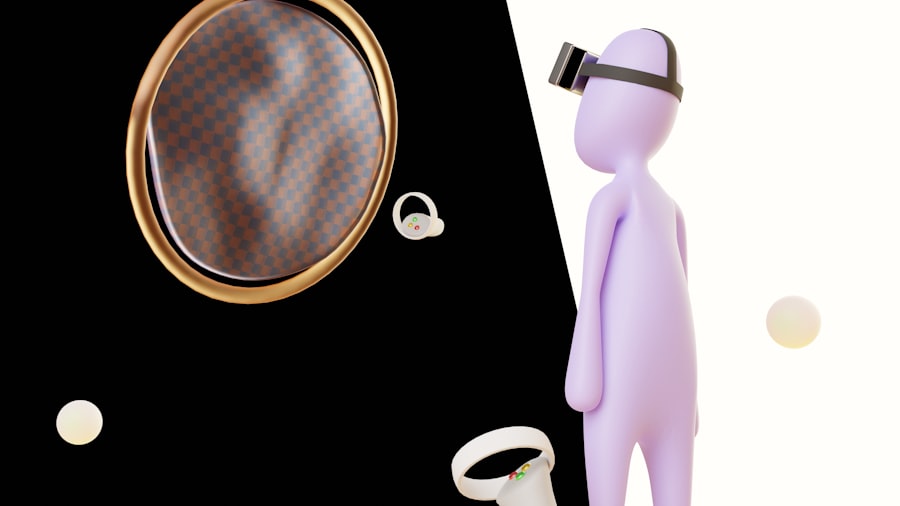Depersonalization and derealization are psychological phenomena that can leave you feeling detached from your own thoughts, feelings, or sense of self. When you experience depersonalization, you may feel as though you are an outside observer of your own life, as if you are watching yourself in a movie. This can lead to a profound sense of disconnection from your body and emotions, making it difficult to engage with the world around you.
On the other hand, derealization involves a sense of unreality regarding your surroundings. You might perceive the world as foggy, dreamlike, or distorted, as if everything around you is not quite real. These experiences can be unsettling and confusing, often leading to anxiety and distress.
While they can occur in response to extreme stress or trauma, they can also manifest without any clear trigger. For many individuals, these episodes can be fleeting, but for others, they may become chronic, significantly impacting daily functioning. Understanding these phenomena is crucial for recognizing their effects and seeking appropriate help.
Key Takeaways
- Depersonalization/Derealization is a mental health condition characterized by feeling detached from oneself or the world around them.
- Symptoms of Depersonalization/Derealization include feeling like an outside observer of one’s thoughts or body, and experiencing a sense of unreality or detachment from the environment.
- Causes of Depersonalization/Derealization can include trauma, stress, anxiety, and substance abuse.
- Depersonalization/Derealization can affect daily life by causing difficulties in relationships, work, and overall functioning.
- Diagnosing Depersonalization/Derealization involves a thorough evaluation of symptoms and ruling out other potential causes.
Symptoms and Signs of Depersonalization/Derealization
The symptoms of depersonalization and derealization can vary widely from person to person. You might find yourself feeling emotionally numb or disconnected from your thoughts, as if they belong to someone else. This can lead to a sense of confusion about your identity and a feeling that you are not in control of your own actions.
You may also experience physical sensations that feel foreign or unfamiliar, such as a tingling sensation or a sense of heaviness in your limbs. In terms of derealization, you might notice that your environment seems distorted or unreal. Colors may appear muted, sounds may seem distant, and familiar places may feel strange or unwelcoming.
These experiences can be accompanied by anxiety or panic attacks, as the mind struggles to reconcile the disconnection from reality. Recognizing these symptoms is essential for understanding what you are going through and for seeking the right support.
Causes of Depersonalization/Derealization

The causes of depersonalization and derealization are complex and multifaceted. Often, these experiences are linked to significant stress or trauma. You might find that they arise during or after a particularly challenging life event, such as the loss of a loved one, a traumatic accident, or prolonged emotional distress.
In some cases, these feelings can be a coping mechanism, allowing your mind to distance itself from overwhelming emotions or situations. Additionally, certain mental health conditions can contribute to the development of depersonalization and derealization.
Substance use can also play a role; for instance, the use of hallucinogenic drugs or even withdrawal from certain substances can trigger episodes of depersonalization or derealization. Understanding the underlying causes is vital for addressing these experiences effectively.
How Depersonalization/Derealization Affects Daily Life
| Impact Area | Effects |
|---|---|
| Social Interactions | Difficulty connecting with others, feeling detached in conversations |
| Work or School | Decreased productivity, difficulty focusing, feeling disconnected from tasks |
| Emotional Well-being | Increased anxiety, feeling numb or disconnected from emotions |
| Physical Health | Heightened stress levels, disrupted sleep patterns, fatigue |
| Everyday Activities | Difficulty enjoying hobbies, feeling like life is unreal or dreamlike |
Living with depersonalization and derealization can significantly impact your daily life. You may find it challenging to engage in social situations or maintain relationships due to feelings of disconnection. The inability to fully experience emotions can lead to misunderstandings with friends and family, who may not grasp what you are going through.
This isolation can exacerbate feelings of loneliness and despair. Moreover, your ability to perform everyday tasks may be compromised. Simple activities like driving, working, or even enjoying hobbies can become daunting when you feel detached from reality.
You might struggle with concentration and memory, making it difficult to focus on tasks at hand. This ongoing struggle can create a cycle of anxiety and frustration, further entrenching the feelings of depersonalization and derealization in your life.
Diagnosing Depersonalization/Derealization
Diagnosing depersonalization and derealization typically involves a comprehensive evaluation by a mental health professional. During this process, you will likely discuss your symptoms in detail, including their frequency and duration. The clinician may ask about any recent stressors or traumatic events that could have contributed to your experiences.
It’s essential to be open and honest during this assessment to ensure an accurate diagnosis. In some cases, the clinician may use standardized questionnaires or diagnostic criteria outlined in the Diagnostic and Statistical Manual of Mental Disorders (DSM-5). This manual provides guidelines for identifying various mental health conditions, including depersonalization/derealization disorder.
A thorough diagnosis is crucial for determining the most effective treatment plan tailored to your specific needs.
Treatment Options for Depersonalization/Derealization

Treatment for depersonalization and derealization often involves a combination of therapeutic approaches tailored to your individual circumstances. Psychotherapy is one of the most common treatment options. Cognitive-behavioral therapy (CBT) can help you identify negative thought patterns and develop coping strategies to manage symptoms more effectively.
Through therapy, you can work on grounding techniques that help you reconnect with your thoughts and feelings. In some cases, medication may be prescribed to address underlying mental health conditions contributing to depersonalization and derealization. Antidepressants or anti-anxiety medications may be considered if deemed appropriate by your healthcare provider.
It’s important to remember that treatment is highly individualized; what works for one person may not work for another. Collaborating closely with a mental health professional will help you find the most effective path forward.
Coping Strategies for Depersonalization/Derealization
In addition to professional treatment, there are several coping strategies you can employ to manage symptoms of depersonalization and derealization in your daily life. Mindfulness practices can be particularly beneficial; engaging in mindfulness meditation or deep-breathing exercises can help ground you in the present moment. These techniques encourage awareness of your surroundings and bodily sensations, which can counteract feelings of detachment.
Another effective strategy is maintaining a routine that includes physical activity and social interaction. Regular exercise has been shown to improve mood and reduce anxiety levels, which may help alleviate symptoms of depersonalization and derealization. Additionally, connecting with supportive friends or family members can provide a sense of belonging and understanding during difficult times.
Finding creative outlets such as art or writing can also serve as a therapeutic way to express your feelings and experiences.
Seeking Support for Depersonalization/Derealization
Seeking support is an essential step in managing depersonalization and derealization effectively. You don’t have to navigate this journey alone; reaching out to friends, family members, or support groups can provide comfort and understanding. Sharing your experiences with others who have faced similar challenges can foster a sense of community and reduce feelings of isolation.
Professional support is equally important. Engaging with a therapist who specializes in dissociative disorders can offer valuable insights and coping strategies tailored to your needs. They can guide you through the therapeutic process while providing a safe space for exploration and healing.
Remember that seeking help is a sign of strength; taking proactive steps toward understanding and managing your experiences is crucial for reclaiming your sense of self and reality. In conclusion, depersonalization and derealization are complex psychological phenomena that can significantly impact your life. By understanding their symptoms, causes, and effects on daily functioning, you can take informed steps toward seeking help and implementing coping strategies.
Remember that recovery is possible; with the right support and treatment options, you can work toward regaining a sense of connection with yourself and the world around you.
Depersonalization and derealization are dissociative disorders that can significantly impact an individual’s perception of reality, often leading to feelings of detachment from oneself or the surrounding environment. For those seeking to understand these conditions better, an insightful article on the topic can be found on Unplugged Psych. This resource delves into the nuances of depersonalization and derealization, offering valuable information and coping strategies. To explore this further, you can read more about it on their website.
LEARN MORE About Depersonalization & Derealization
FAQs
What is depersonalization/derealization?
Depersonalization/derealization is a mental health condition characterized by feeling detached from oneself (depersonalization) and/or feeling detached from the surrounding environment (derealization). It can be a symptom of various mental health disorders, such as anxiety, depression, and post-traumatic stress disorder.
What are the symptoms of depersonalization/derealization?
Symptoms of depersonalization/derealization may include feeling like an outside observer of one’s thoughts, feelings, and body (depersonalization), feeling like the world is unreal or distorted (derealization), emotional numbness, and a sense of disconnection from oneself and others.
What causes depersonalization/derealization?
Depersonalization/derealization can be caused by various factors, including trauma, stress, anxiety, depression, substance abuse, and certain personality traits. It can also be a side effect of certain medications or a symptom of other mental health disorders.
How is depersonalization/derealization treated?
Treatment for depersonalization/derealization may include therapy (such as cognitive behavioral therapy), medication (such as antidepressants or anti-anxiety medications), stress management techniques, and addressing any underlying mental health conditions. It’s important for individuals experiencing these symptoms to seek professional help for an accurate diagnosis and appropriate treatment plan.
Can depersonalization/derealization be cured?
While there is no specific “cure” for depersonalization/derealization, many individuals can experience significant improvement and symptom management with proper treatment and support. It’s important for individuals to work with mental health professionals to develop coping strategies and address any underlying issues contributing to their symptoms.




